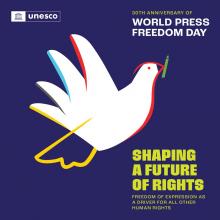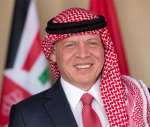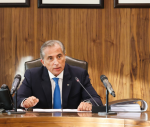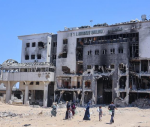You are here
Freedom of expression: A driver of other freedoms
May 02,2023 - Last updated at May 02,2023
Every year, on 3 May, UNESCO leads the World Press Freedom Day celebrations to mark the crucial role that a free press plays in informing citizens about public affairs, promoting democracy and sustainable development. It aims to draw attention to the importance of press freedom as a prerequisite of a healthy, functioning democracy in which people are free to express their opinions.
The day also serves as an occasion to pay tribute to journalists who have lost their lives to bring truth to light and give recognition to the women and men who put their lives at risks to provide a platform for diverse voices to be heard and to hold those in power accountable for their actions.
Since its proclamation by the United Nations General Assembly 30 years ago, World Press Freedom Day has been giving prominence to the right to free expression and emphasizing various aspects of press freedom’s importance. However, in the face of multiple crises, media freedom, journalist safety and freedom of expression, as well as other human rights are increasingly under attack.
Reflecting this reality and in commemoration of the 75th anniversary of the Universal Declaration of Human Rights (UDHR), this year’s theme for the World Press Freedom Day is “Shaping a future of rights — Freedom of Expression as a driver for all other human rights” to signify the enabling element of freedom of expression, enshrined in Article 19 of the UDHR, to enjoy and protect all other human rights.
This includes freedom of association and peaceful assembly, freedom of thought, religion or belief, the right to take part in cultural life, the right to education, the right to vote and all other political rights related to participation in public affairs. The right to freedom of expression or to peaceful assembly are enablers to claim not only these freedoms and rights but also other economic and social rights such as the right to an adequate standard of living, the right to decent work, and to a clean and healthy environment.
The right to freedom of expression also facilitates the realization of the 2030 Agenda for Sustainable Development. Press freedom and the right to information have a direct relevance to achieving Sustainable Development Goal 16 — which calls for promoting peaceful and inclusive societies, providing access to justice for all and building effective, accountable and inclusive institutions at all levels.
For the press to be free, journalists must be allowed to exercise their profession in safety and in freedom from fear. Safety of journalists should concern all of us because intimidation and attacks on freedom of expression may start with journalism, but they may also threaten other freedoms. Scientific research; academic freedom; expression of cultural, linguistic, and religious identity; human rights discussions; political discourse; and artistic creation are all examples of expressions that are covered by freedom of expression.
It is vital for the public to cherish this right which is not an absolute right. No one can be allowed to incite attacks on the more vulnerable or violate people's privacy, for example. But any limitations need to be highly exceptional, and they should be specified in a law rather than be arbitrarily applied. The UDHR adds that any limitations have to be shown as necessary within a democracy, and that they must conform to one of only a few legitimate reasons — like the rights of others to safety or dignity.
In early 2022, Jordanian lawmakers amended the laws on elections and political parties and enacted constitutional amendments in line with the recommendations issued by the Royal Committee to Modernise the Political System convened by Jordan’s King Abdullah II in 2021.
The recommendations of the Royal Committee emphasised the need for “full respect for human rights and the creation of a safe space for fundamental freedoms that would enable political participation”. It also mentions that “modernising the media and ensuring their independence is crucial for political modernisation” and that “it is inconceivable to develop a democratic model without free and responsible media and without the free flow of information”.
Robust legal frameworks would be needed to support the modernisation, independence and financial viability of the media and specific measures to ensure that journalists can do their jobs freely. In addition, new regulations for social media transparency, independent state subsidies to trustworthy news outlets, greater support for public service media, increased media development assistance, and ramped up philanthropic investments would be required. For their part, journalists should uphold the integrity of the profession in the face of pressure, and media outlets need to do better at digital innovation.
One universal feature of humanity is the profound desire of human beings to be able to shape their own destinies. World Press Freedom Day is an opportunity to recall that freedom of expression and media freedom are mutually reinforcing factors for creating a space in which every child, youth, woman and man can shape her or his own destiny to flourish and realise their full potential.
Recognising the importance of media independence and pluralism in promoting a healthy and open public debate, UNESCO in Jordan will continue to advocate for and support these efforts as the United Nations agency with the mandate to defend and promote freedom of expression, freedom of the press and universal access to information.
Min Jeong Kim is UNESCO representative in Jordan













